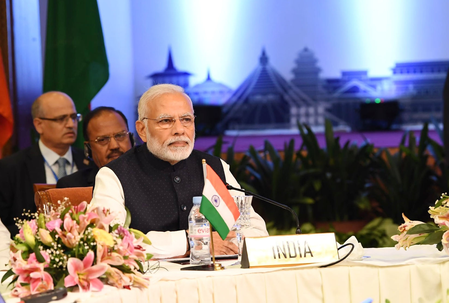Strengthening ties: How India is shaping the future of BIMSTEC
New Delhi, April 1 (IANS) India plays a dynamic and central role in the Bay of Bengal Initiative for Multi-Sectoral Technical and Economic Cooperation (BIMSTEC), acting as a key driver of regional integration and cooperation.
Significantly, India is the largest and most influential member of the grouping. It has been instrumental in shaping BIMSTEC’s agenda and promoting collaboration across various sectors.
The grouping, which connects South Asia and Southeast Asia, brings together seven member states — Bangladesh, Bhutan, India, Nepal, and Sri Lanka from South Asia, and Myanmar and Thailand from Southeast Asia.
These nations of the grouping together account for 1.7 billion people and a combined GDP of US$ 5 trillion. Through its leadership and active participation, India has significantly contributed to the development of BIMSTEC, especially in areas of security, connectivity, trade, and climate change.
Hopes are high as Prime Minister Narendra Modi is set to attend the BIMSTEC Summit on April 3 and 4, to be held in Thailand. Experts say that the presence of the Indian leader will further elevate India’s prominent role on the regional stage, reinforcing its leadership in enhancing cooperation and progress within the BIMSTEC framework.
Established in 1997 through the ‘Bangkok Declaration’, BIMSTEC has since then developed into an entity which is a key player in promoting regional cooperation across various sectors.
As a leader in various sectors, New Delhi spearheads the security pillar that includes critical areas such as counter-terrorism, transnational crime, disaster management, and energy security.
Remarkably, India is the host country for major BIMSTEC institutions such as the BIMSTEC Centre for Weather and Climate (BCWC) based in Noida. This entity provides vital weather data for the region. Moreover, another institution is the BIMSTEC Energy Centre in Bengaluru, which focuses on energy security.
It was during the 5th BIMSTEC Summit held in Colombo in 2022 that India’s leadership was highlighted prominently. On this occasion, India committed to a series of initiatives which were aimed at advancing regional cooperation. These included a one-time grant of USD 1 million to help the BIMSTEC Secretariat complete its institutional development, and the launch of capacity-building programs, such as the trade facilitation initiative by ICRIER in collaboration with the Asian Development Bank (ADB).
There are several examples that bear testimony to India taking a leading role in the grouping. India has broadened the scope of the BIMSTEC Nalanda Scholarship Scheme with a view to providing more opportunities for students in the region.
India also initiated the BIMSTEC-India Marine Research Network (BIMReN) in 2024, focusing on collaboration among marine science institutes in the region.
India has commissioned a study by RIS on creating regional value chains and promoting value-added agricultural products in the BIMSTEC region in what is seen as a significant development. This initiative reflected Delhi’s commitment to fostering economic development.
Delhi’s clout in BIMSTEC, undoubtedly, goes beyond policy and diplomacy. India organised the BIMSTEC Aquatics Championship in New Delhi in 2024. This highlighted the country’s leadership in sports and cultural exchanges. The event attracted more than 400 athletes from all BIMSTEC countries. It solidified India’s role further in promoting regional unity through sports.
India also organised the BIMSTEC Youth Summit in Ahmedabad in 2025. It had focused on entrepreneurship, digital connectivity, and sustainable development, with over 70 youth delegates participating. India also hosted a BIMSTEC Pavilion at the 38th Surajkund International Crafts Fair, highlighting regional cultural diversity and fostering deeper cultural exchanges among BIMSTEC member states.
India played a key role in the BIMSTEC Youth Led Conference on Climate Change in New Delhi in February 2025. Over 150 participants from across the region came together to engage in discussions on sustainable development and climate change mitigation, highlighting India’s leadership in addressing the global challenge of climate change.
These initiatives led to India continuing to be a driving force behind BIMSTEC’s efforts to foster deeper regional integration, promote security cooperation, advance sustainable development, and enhance cultural and people-to-people ties across the Bay of Bengal region.
–IANS
brt/dan
Discover more from tennews.in: National News Portal
Subscribe to get the latest posts sent to your email.




Comments are closed.